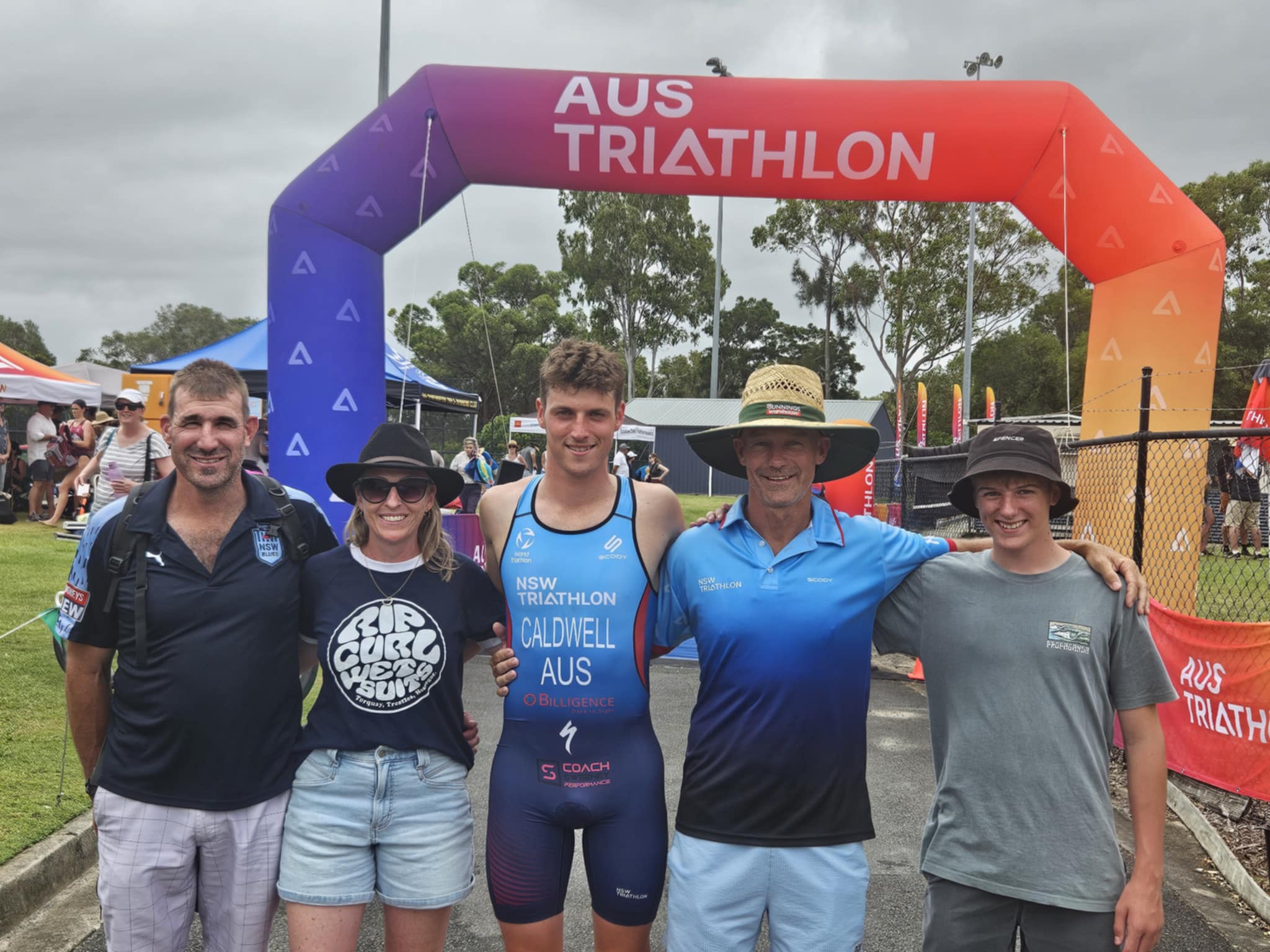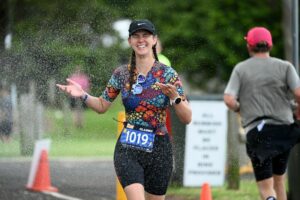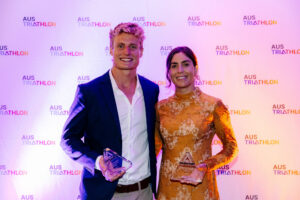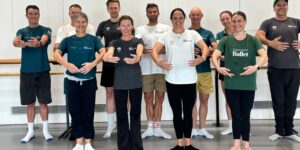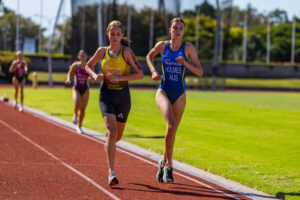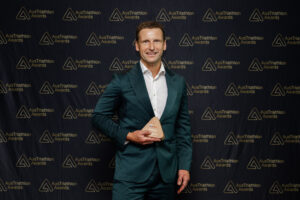As we continue our Road to Wollongong stories, we took the opportunity to catch up with James Sweeney of Coach Sweeney Performance. James, coach of rising star Jack Caldwell, who is preparing to take on the world stage at the Junior World Championships in October, shares an insight into his role, and the importance coaches play in an athlete’s journey. Alongside the role of Coach in Wollongong, James is also representing Team AUS in the Sprint Triathlon.
Can you share your own journey in triathlon and what led you to coaching? What keeps you passionate about it?
A good mate and family friend John Maclean introduced me to tri in 1996 and I loved it. My first race was the St George Standard distance at Penrith Regatta Centre. I was immediately drawn to the challenge of distance and pretty quickly focused on doing an Ironman. Over the years I have raced all distances and loved the challenge each sets for you. With age comes some injuries, but despite this I qualified for Wollongong in the sprint, so that will be fun.
I fell into coaching by just helping out some mates and it grew from there. Over the years my focus was age group athletes, until I met Mick Ferris and he showed me the challenges and rewards of coaching junior and U23 athletes and thus began my more focussed approach to the junior pathway programs. During the first covid lockdown my employment situation changed and, with the support of my wife Tracy, I started Coach Sweeney Performance and became a fulltime coach. Whilst my primary role is within triathlon, I also support several athletes in other sports for strength & conditioning, so my role is varied and rewarding.
The athletes I deal with are mainly what keep me passionate about coaching. When I am in the middle of a coaching session and everyone is committing to improving and working hard then I am in my happy space. All sport and jobs have politics and administration which can be a drag. However, when I am coaching face to face in the moment, life is pretty awesome.
What’s your coaching philosophy and how do you tailor your approach for junior athletes in particular?
This probably varies a bit and evolves as I continue to learn and be exposed to new things and thinking. At a fundamental level, I work around the following pillars. Work ethic, two-way conversations, tough love, honesty. It’s difficult to excel and become an elite athlete in any sport, and genetics probably determine what your ultimate potential is. But, work ethic determines how close you get to realising your potential. Two-way conversations are key. They help you learn about your athlete and what works for them. This allows you to tailor things better to suit and also to explain better why something needs to be a certain way. Two-way conversations also allow the athlete to see that they have ownership of their path. Most athletes are surrounded by supporters who encouragingly tell them how awesome they are and can give a false sense of capability or achievement, so giving tough love is about being tough, but fair, in your feedback to the athletes so that they gain improved perspective on where they are currently and what needs to be done to become better. A quote I like is “better a honest slap than a false kiss”. Honesty, I feel this is crucial with athletes and coaches for anything to be successful. You cannot expect full commitment from either person if one or both cannot be honest in their conversations about any topic. There will be some really tough sessions, or days that don’t go as planned, and there has to be enough trust within the relationship that honest conversations can be had to continue improving for both.
Your athlete Jack had an amazing season, qualifying for the Australian Junior World Championships team, tell us a bit about how you started with this athlete and his history in the sport?
Jack’s season had a lot of highs, winning all available junior titles for National and Oceania and auto qualifying for Junior World Championships in Wollongong. I first met Jack at a NSW talent ID camp organised by Robyn Low-Hart. Jack was new to the sport with no bike background. During camp we did some sessions together and when he went back home he had a discussion with his parents about getting a coach. They approached me and here we are now. Jack is in his third season of triathlon. Prior to this he swam and played cricket, footy and athletics.
How has your role as a coach evolved with Jack over time, and what are the growth moments for you both that have really stood out most in the journey to the World Champs?
My role with Jack has evolved a lot, and quickly. When I first started coaching Jack, he lived in Eden, 600km from Penrith and I coached him via Training Peaks, text messages and regular phone calls. Now he’s finished school, he lives in my house and trains face-to-face on a daily basis. I feel our biggest growth moments have been around injury, as Jack has had a few in this time. Partly due to growth and partly due to how quickly his body was performing at a high level and partly due to his work ethic. We have together, along with his physios Matt and Justin, worked out how to best manage his body to keep him in good shape. The other growth area has been for me to understand how quickly I had to evolve as his coach to keep pace with his improvement and rethink some more ingrained training approaches I had.
We’d love to hear some of those behind-the-scenes moments, where you felt coaching made a real difference to Jack?
In the early days giving Jack insight to the aspects of draft legal racing was big as he had no background in this. Otherwise, it has really been lots of small moments where we would have conversations about how to look after himself better, how something in training needs to be done and why. How to remain calm during adversity and to learn patience at these times was also key. This is still a work in progress. I think me learning what style of coaching works with Jack has been important too. We have a training style, and a race day style. They are different, but they work for Jack, and I had to be the one to adjust my style to make it work.
Generally, in your experience, what impact can a coach have on an athlete’s mindset, motivation and long-term success?
I feel coaches can set their athletes up for success or for failure by their words and language and also by the way they treat an athlete. I feel as a coach my job is to encourage a growth mindset and a critical thinking athlete. If I can build self-confidence in the athlete, then in challenging situations they will draw on that and grow in the face of the challenge, rather than shrink and thereby achieve a better result than they otherwise would have. Motivation comes from within in my view. Athletes needs to bring this. If I have to be driving and motivating the athlete then the journey will be short for them. In key moments in training there is a place for coaching encouragement and motivation to get through the tough bits, but day-to-day it must come from within. Teaching as many lessons about how to implement good daily practices and habits to allow training and recovery and self-growth to happen, constantly learning and being open to evolving as an athlete are keys to long-term success.
Looking to Wollongong – it’s a pretty rare and special opportunity to compete at such a high level on home soil. What are your hopes for Jack in Wollongong?
A home world championships is amazing. I think more so for everyone who has been on this journey with Jack as they will all get to come to Wollongong and watch him race live and celebrate with him after the race, no matter the result. This is pretty rare and special for both the athlete and everyone in their life.
My hope for Jack is a gold medal. There are obviously many good athletes from around the world coming, so nothing is guaranteed. Jack has worked hard to be a ready for this race and has invested himself wholeheartedly into being as prepared as he can be. I believe the experienced gained, and growth, will come in being given the opportunity to be in camp in the lead up to the World Champs with the rest of the Australian high performance team made up of the junior, U23 and elite athletes and associated coaches.
What message would you share with other young athletes, or coaches of young athletes watching this journey unfold?
Enjoy the journey, work hard and commit yourself to the goals and dreams you want to achieve. There will be lots of ups and downs, enjoy the good days and learn from the not so good days. Don’t get ahead of yourself, as boring as it sounds just take each day and do it successfully, then everything else will follow. Don’t take for granted the people around you who quietly help you become the athlete you want to be. They are invested too. Remember to thank them!
James Sweeney Bio
James Sweeney is a seasoned AusTriathlon Performance Coach known for his commitment to athlete development across all levels of the sport. As Head Coach of the Western Sydney Academy of Sport, James plays a pivotal role in nurturing emerging talent, while also leading his own performance squad, Coach Sweeney Performance.
James is a regular coaching presence within NSW Triathlon Pathway, supporting and guiding juniors through key stages of their triathlon journey with genuine mentorship, empowering athletes to reach their full potential both on and off the course.
Beyond coaching, James is a passionate competitor himself – still racing regularly. His dual perspective as coach and athlete provides a strong and empathetic ability to connect, inspire, and drive for results.
